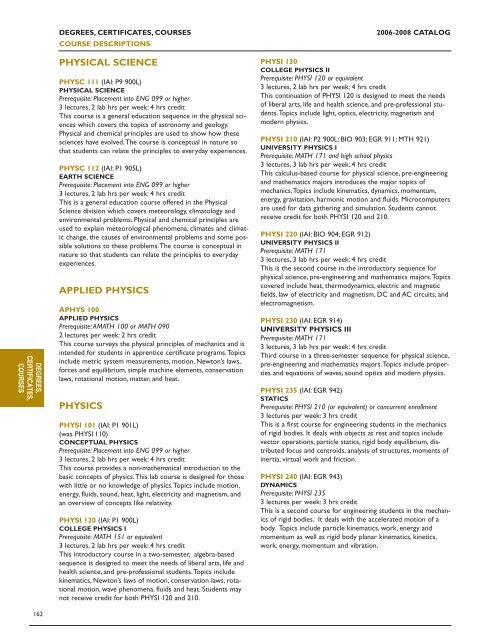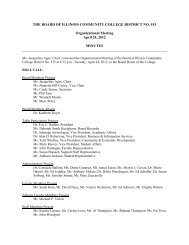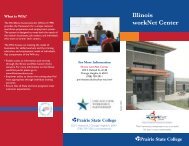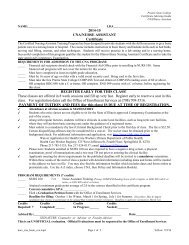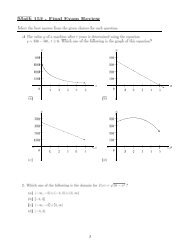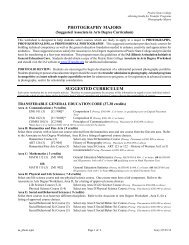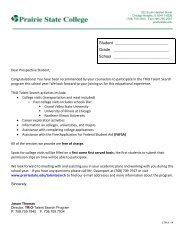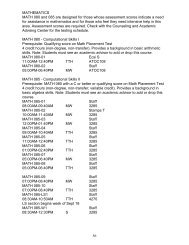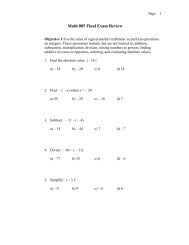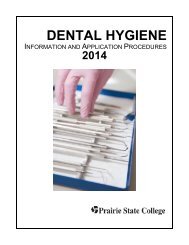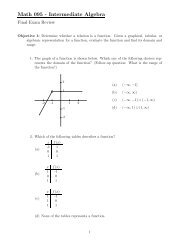DEGREES,CERTIFICATES,COURSES162DEGREES, CERTIFICATES, COURSESCOURSE DESCRIPTIONSPHYSICAL SCIENCEPHYSC 111 (IAI: P9 900L)PHYSICAL SCIENCEPrerequisite: Placement into ENG 099 or higher3 lectures, 2 lab hrs per week: 4 hrs creditThis course is a general education sequence in the physical scienceswhich covers the topics of astronomy and geology.Physical and chemical principles are used to show how thesesciences have evolved.The course is conceptual in nature sothat students can relate the principles to everyday experiences.PHYSC 112 (IAI: P1 905L)EARTH SCIENCEPrerequisite: Placement into ENG 099 or higher3 lectures, 2 lab hrs per week: 4 hrs creditThis is a general education course offered in the PhysicalScience division which covers meteorology, climatology andenvironmental problems. Physical and chemical principles areused to explain meteorological phenomena, climates and climaticchange, the causes of environmental problems and some possiblesolutions to these problems.The course is conceptual innature so that students can relate the principles to everydayexperiences.APPLIED PHYSICSAPHYS 100APPLIED PHYSICSPrerequisite: AMATH 100 or MATH 0902 lectures per week: 2 hrs creditThis course surveys the physical principles of mechanics and isintended for students in apprentice certificate programs.Topicsinclude metric system measurements, motion, Newton’s laws,forces and equilibrium, simple machine elements, conservationlaws, rotational motion, matter, and heat.PHYSICSPHYSI 101 (IAI: P1 901L)(was PHYSI 110)CONCEPTUAL PHYSICSPrerequisite: Placement into ENG 099 or higher3 lectures, 2 lab hrs per week: 4 hrs creditThis course provides a non-mathematical introduction to thebasic concepts of physics.This lab course is designed for thosewith little or no knowledge of physics.Topics include motion,energy, fluids, sound, heat, light, electricity and magnetism, andan overview of concepts like relativity.PHYSI 120 (IAI: P1 900L)COLLEGE PHYSICS IPrerequisite: MATH 151 or equivalent3 lectures, 2 lab hrs per week: 4 hrs creditThis introductory course in a two-semester, algebra-basedsequence is designed to meet the needs of liberal arts, life andhealth science, and pre-professional students.Topics includekinematics, Newton’s laws of motion, conservation laws, rotationalmotion, wave phenomena, fluids and heat. Students maynot receive credit for both PHYSI 120 and 210.2006-2008 CATALOGPHYSI 130COLLEGE PHYSICS IIPrerequisite: PHYSI 120 or equivalent3 lectures, 2 lab hrs per week: 4 hrs creditThis continuation of PHYSI 120 is designed to meet the needsof liberal arts, life and health science, and pre-professional students.Topicsinclude light, optics, electricity, magnetism andmodern physics.PHYSI 210 (IAI: P2 900L; BIO 903; EGR 911; MTH 921)UNIVERSITY PHYSICS IPrerequisite: MATH 171 and high school physics3 lectures, 3 lab hrs per week: 4 hrs creditThis calculus-based course for physical science, pre-engineeringand mathematics majors introduces the major topics ofmechanics.Topics include kinematics, dynamics, momentum,energy, gravitation, harmonic motion and fluids. Microcomputersare used for data gathering and simulation. Students cannotreceive credit for both PHYSI 120 and 210.PHYSI 220 (IAI: BIO 904; EGR 912)UNIVERSITY PHYSICS IIPrerequisite: MATH 1713 lectures, 3 lab hrs per week: 4 hrs creditThis is the second course in the introductory sequence forphysical science, pre-engineering and mathematics majors.Topicscovered include heat, thermodynamics, electric and magneticfields, law of electricity and magnetism, DC and AC circuits, andelectromagnetism.PHYSI 230 (IAI: EGR 914)UNIVERSITY PHYSICS IIIPrerequisite: MATH 1713 lectures, 3 lab hrs per week: 4 hrs creditThird course in a three-semester sequence for physical science,pre-engineering and mathematics majors.Topics include propertiesand equations of waves, sound optics and modern physics.PHYSI 235 (IAI: EGR 942)STATICSPrerequisite: PHYSI 210 (or equivalent) or concurrent enrollment3 lectures per week: 3 hrs creditThis is a first course for engineering students in the mechanicsof rigid bodies. It deals with objects at rest and topics includevector operations, particle statics, rigid body equilibrium, distributedfocus and centroids, analysis of structures, moments ofinertia, virtual work and friction.PHYSI 240 (IAI: EGR 943)DYNAMICSPrerequisite: PHYSI 2353 lectures per week: 3 hrs creditThis is a second course for engineering students in the mechanicsof rigid bodies. It deals with the accelerated motion of abody. Topics include particle kinematics, work, energy andmomentum as well as rigid body planar kinematics, kinetics,work, energy, momentum and vibration.
2006-2008 CATALOGPLUMBING, PIPEFITTER/STEAMFITTER - APPRENTICEAPPPF 101FUNDAMENTALS OF PLUMBINGPrerequisite: None2 lectures per week: 2 hrs creditThe specifications, applications and maintenance of pipes, fittingsand valves; simple pipe calculations and template development;tools used in piping; proper valve installation and maintenance;and consideration of safe working pressures of pipes and valvesare covered.APPPF 102DRAINS,WASTES AND VENTSPrerequisite: None2 lectures per week: 2 hrs creditTo acquaint the student with the proper materials for sewer,soil, vent and waste pipes; principles of drainage flow and properventing; traps and installation of unit sanitation equipmentand joints and fittings used on drainage systems.APPPF 103PLUMBING AND PIPEFITTING HEATINGPrerequisite: None2 lectures per week: 2 hrs creditThe principles of steam and hydronic heating, various types ofsteam systems in use, and proper sizing and tapping of steamunits. Study of hydronics includes one-pipe, two-pipe, high temperatureand pressure systems, heat loss calculations and thedesign of hydronic systems.APPPF 104PLUMBING AND PIPEFITTING CODEPrerequisite: None2 lectures per week: 2 hrs creditPlumbing rules and regulations governing installation of plumbingsystems, rules and regulations pertaining to joints, traps,cleanouts, water distribution, fixtures and drainage.POLITICAL SCIENCEPOLSC 101 (IAI: S5 903)PRINCIPLES OF POLITICAL SCIENCEPrerequisite: Placement into ENG 099 or higher3 lectures per week: 3 hrs creditThis course provides an introduction to the core concepts ofpolitical science. Students explore the questions political scientistsask, the means by which they answer those questions, andthe types of answers that have emerged in response to contemporaryproblems.POLSC 140 (IAI: S5 900; PLS 911)INTRODUCTION TO U.S. GOVERNMENT AND POLITICSPrerequisite: Placement into ENG 099 or higher3 lectures per week: 3 hrs creditThis course introduces students to the core concepts in politicalscience that allow for a better understanding of the principlesand organization of government and politics in the United<strong>State</strong>s.POLSC 152 (IAI: S5 902; PLS 915)U.S., STATE AND LOCAL GOVERNMENTPrerequisite: Placement into ENG 099 or higher3 lectures per week: 3 hrs creditThis course describes the politics, function and decision-makingprocess of state and local governments in the United <strong>State</strong>s.Special emphasis is placed on the historical development ofIllinois government and political culture. Current issues facingstate and local government agencies are also described and discussed.POLSC 230 (IAI: S5 905; PLS 914)INTRODUCTION TO COMPARATIVE GOVERNMENTPrerequisite: Placement into ENG 099 or higher3 lectures per week: 3 hrs creditThis introduction to comparative politics encompasses bothWestern and Non-Western political structures. Emphasis is onthe political economy of development, the causes and effects ofdifferent systems of government, and the historical and culturalcontext of political formations across the globe.POLSC 240 (IAI: S5 904N; PLS 912)INTRODUCTION TO INTERNATIONAL RELATIONSPrerequisite: Placement into ENG 099 or higher3 lectures per week: 3 hrs creditThis course introduces students to the core concepts andmajor issues shaping international relations and world politics.Topics to be explored may include: globalization, internationalorganizations, human rights, environmental problems, development,terrorism, war and peace.PSYCHOLOGYDEGREES, CERTIFICATES, COURSESCOURSE DESCRIPTIONSPSYCH 101 (IAI: S6 900; SPE 912)INTRODUCTION TO PSYCHOLOGYPrerequisite: Placement into ENG 099 or higher3 lectures per week: 3 hrs creditThis course introduces psychology as a scientific approach tounderstanding human behavior.The history of the field, itsmethods and research tools are covered.Topics include physiology,sensation, perception, motivation, learning and memory,maturation and development, personality, individual differences,social behavior, and abnormal behavior and its therapies.PSYCH 102 (IAI: S6 902; EED 903; PSY 904; SED 903)HUMAN GROWTH AND DEVELOPMENT: LIFE SPANPrerequisite: PSYCH 1013 lectures per week: 3 hrs creditThis course surveys the normal biological cognitive, social, emotionaland personality development characteristics of life phasesfrom conception through adulthood to death.PSYCH 106ETHICS OF DEATH AND DYINGPrerequisite: None3 lectures per week: 3 hrs creditThis course will explore various definitions of death and dying,existential philosophies of death, the rights of a dying person,the grief process, the emotional stages experienced by a personfacing death and how these stages represent an evolution ofhuman development.DEGREES,CERTIFICATES,COURSES163
- Page 1 and 2:
A comprehensive community college20
- Page 3 and 4:
2006-2008 CATALOGIllinois Community
- Page 5 and 6:
2006-2008 CATALOGCONTENTSOVERVIEW:
- Page 7 and 8:
2006-2008 CATALOGOVERVIEWGETTING AC
- Page 9 and 10:
2006-2008 CATALOGOVERVIEWASSOCIATE
- Page 11 and 12:
2006-2008 CATALOGOVERVIEWIllinois E
- Page 13 and 14:
2006-2008 CATALOGENROLLMENTSTARTING
- Page 15 and 16:
2006-2008 CATALOGENROLLMENT7. Pay t
- Page 17 and 18:
2006-2008 CATALOGENROLLMENTSPECIAL
- Page 19 and 20:
2006-2008 CATALOGPOLICIES & GUIDELI
- Page 21 and 22:
2006-2008 CATALOGPOLICIES & GUIDELI
- Page 23 and 24:
2006-2008 CATALOGPOLICIES & GUIDELI
- Page 25 and 26:
2006-2008 CATALOGPOLICIES & GUIDELI
- Page 27 and 28:
2006-2008 CATALOGPOLICIES & GUIDELI
- Page 29 and 30:
2006-2008 CATALOGSTUDENT SERVICESFI
- Page 31 and 32:
2006-2008 CATALOGSTUDENT SERVICESFI
- Page 33 and 34:
2006-2008 CATALOGSTUDENT SERVICESOT
- Page 35 and 36:
2006-2008 CATALOGSTUDENT LIFEEXPERI
- Page 37 and 38:
2006-2008 CATALOGSTUDENT LIFENORTH
- Page 39 and 40:
2006-2008 CATALOGSTUDENT LIFECULTUR
- Page 41 and 42:
2006-2008 CATALOGDEGREES, CERTIFICA
- Page 43 and 44:
2006-2008 CATALOGILLINOIS ARTICULAT
- Page 45 and 46:
2006-2008 CATALOGFine Arts CoursesA
- Page 47 and 48:
2006-2008 CATALOGDEGREES, CERTIFICA
- Page 49 and 50:
2006-2008 CATALOGDEGREES, CERTIFICA
- Page 51 and 52:
2006-2008 CATALOGBUSINESSA.A. Degre
- Page 53 and 54:
2006-2008 CATALOGCOMPUTER SCIENCEA.
- Page 55 and 56:
2006-2008 CATALOGEARTH SCIENCE/GEOL
- Page 57 and 58:
2006-2008 CATALOGDEGREES, CERTIFICA
- Page 59 and 60:
2006-2008 CATALOGGENERAL MATH/SCIEN
- Page 61 and 62:
2006-2008 CATALOGLIBERAL ARTSA.A. D
- Page 63 and 64:
2006-2008 CATALOGPRE-MEDICINEA.S. D
- Page 65 and 66:
2006-2008 CATALOGPRE-OCCUPATIONAL T
- Page 67 and 68:
2006-2008 CATALOGPRE-PHYSICAL THERA
- Page 69 and 70:
2006-2008 CATALOGSOCIAL WORKA.A. De
- Page 71 and 72:
2006-2008 CATALOGDEGREES, CERTIFICA
- Page 73 and 74:
2006-2008 CATALOGCAREER PROGRAMSThe
- Page 75 and 76:
2006-2008 CATALOGAUTOMOTIVE ALIGNME
- Page 77 and 78:
2006-2008 CATALOGDEGREES, CERTIFICA
- Page 79 and 80:
2006-2008 CATALOGDEGREES, CERTIFICA
- Page 81 and 82:
2006-2008 CATALOGDEGREES, CERTIFICA
- Page 83 and 84:
2006-2008 CATALOGDEGREES, CERTIFICA
- Page 85 and 86:
2006-2008 CATALOGDEGREES, CERTIFICA
- Page 87 and 88:
2006-2008 CATALOGDEGREES, CERTIFICA
- Page 89 and 90:
2006-2008 CATALOGDEGREES, CERTIFICA
- Page 91 and 92:
2006-2008 CATALOGDEGREES, CERTIFICA
- Page 93 and 94:
2006-2008 CATALOGNURSINGContinuedNU
- Page 95 and 96:
2006-2008 CATALOGINDUSTRIAL ELECTRI
- Page 97 and 98:
2006-2008 CATALOGMANUFACTURING TECH
- Page 99 and 100:
2006-2008 CATALOGINFORMATION TECHNO
- Page 101 and 102:
2006-2008 CATALOGCOMPUTER REPAIR SP
- Page 103 and 104:
2006-2008 CATALOGSPREADSHEET - PROF
- Page 105 and 106:
2006-2008 CATALOGDEGREES, CERTIFICA
- Page 107 and 108:
2006-2008 CATALOGDEGREES, CERTIFICA
- Page 109 and 110:
2006-2008 CATALOGILLINOIS ARTICULAT
- Page 111 and 112:
2006-2008 CATALOGART 126 (IAI: F2 9
- Page 113 and 114: 2006-2008 CATALOGAUTO 214COLLISION
- Page 115 and 116: 2006-2008 CATALOGBIOL 225FUNCTIONAL
- Page 117 and 118: 2006-2008 CATALOGBUS 169MATERIALS H
- Page 119 and 120: 2006-2008 CATALOGBUS 270INTERNATION
- Page 121 and 122: 2006-2008 CATALOGCHEM 203 (IAI: BIO
- Page 123 and 124: 2006-2008 CATALOGCET 114DIGITAL FUN
- Page 125 and 126: 2006-2008 CATALOGDH 108CLINICAL DEN
- Page 127 and 128: 2006-2008 CATALOGEARLY CHILDHOOD ED
- Page 129 and 130: 2006-2008 CATALOGED 220CHILDREN’S
- Page 131 and 132: 2006-2008 CATALOGEMS 230PARAMEDICIN
- Page 133 and 134: 2006-2008 CATALOGENG 241CONTEMPORAR
- Page 135 and 136: 2006-2008 CATALOGFST 213FIRE SERVIC
- Page 137 and 138: 2006-2008 CATALOGGC 185DIGITAL SOUN
- Page 139 and 140: 2006-2008 CATALOGHIST 112 (IAI: S2
- Page 141 and 142: 2006-2008 CATALOGAPPIE 106DC MOTORS
- Page 143 and 144: 2006-2008 CATALOGAPPIE 290SPECIAL T
- Page 145 and 146: 2006-2008 CATALOGNETWORKING - ITNET
- Page 147 and 148: 2006-2008 CATALOGITPRG 141INTRODUCT
- Page 149 and 150: 2006-2008 CATALOGITWEB 220INTERNET
- Page 151 and 152: 2006-2008 CATALOGMAINTENANCE TECHNI
- Page 153 and 154: 2006-2008 CATALOGMATH 096GEOMETRYPr
- Page 155 and 156: 2006-2008 CATALOGMILLWRIGHT - APPRE
- Page 157 and 158: 2006-2008 CATALOGMUSIC 152 (IAI: MU
- Page 159 and 160: 2006-2008 CATALOGNURS 103TRANSITION
- Page 161 and 162: 2006-2008 CATALOGPHOTO 282EXPERIMEN
- Page 163: 2006-2008 CATALOGPE 163GOLFPrerequi
- Page 167 and 168: 2006-2008 CATALOGREGISTERED NURSING
- Page 169 and 170: 2006-2008 CATALOGSRT 298SURGICAL TE
- Page 171 and 172: 2006-2008 CATALOGWELDER - APPRENTIC
- Page 173 and 174: 2006-2008 CATALOGGRADUATION & TRANS
- Page 175 and 176: 2006-2008 CATALOGGRADUATION & TRANS
- Page 177 and 178: 2006-2008 CATALOGDIRECTORYMEETING O
- Page 179 and 180: 2006-2008 CATALOGEXECUTIVE OFFICERS
- Page 181 and 182: 2006-2008 CATALOGDIRECTORYFACULTYFA
- Page 183 and 184: 2006-2008 CATALOGProfessor John Lim
- Page 185 and 186: 2006-2008 CATALOGCheryl Bland-Winbu
- Page 187 and 188: 2006-2008 CATALOGDIRECTORYSUPPORT S
- Page 189 and 190: 2006-2008 CATALOGDIRECTORYSUPPORT S
- Page 191 and 192: 2006-2008 CATALOGINDEXCollege Bowl
- Page 193 and 194: 2006-2008 CATALOGINDEXpre-Manufactu


